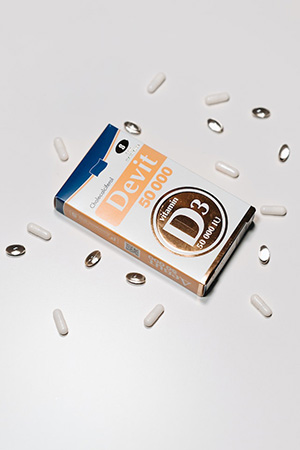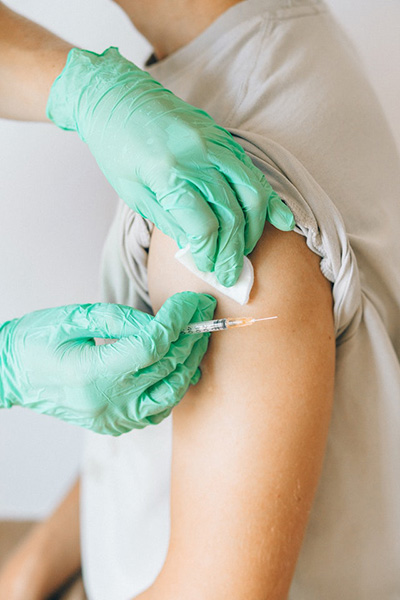Contents
Vitamin D shots are trendy. While many people receive plenty of this essential vitamin from sunshine and nutrition alone, others may require additional support. Injections or shots are a powerful and effective method of providing this essential vitamin. Vitamin D, a fat-soluble vitamin, improves calcium, magnesium, and phosphate absorption in the intestines. Even though it’s classified as a vitamin, it functions like a hormone. The two primary types are:
- Vitamin D2 (ergocalciferol): Derived from plant sources and fortified foods.
- Vitamin D3 (cholecalciferol): Acquired from animal sources and amalgamated by the skin when exposed to sunlight.
Why Consider Vitamin D Shots?

- Fast Absorption: Injections are more efficient and effective than oral supplements since they bypass the digestive system and immediately enter circulation.
- Consistency: There is no need to worry about the patient’s absorption changing due to gastrointestinal difficulties or irregular oral supplement consumption while using injections because the dose is always the same.
- Specific Populations: Injections may benefit those with malabsorption problems, such as Crohn’s disease or celiac disease, or after gastric bypass surgery because they bypass the digestive system entirely.
Benefits of Adequate Vitamin D Levels
- Bone Health: Vitamin D is critical for calcium absorption. Thus, it can protect against diseases like rickets and osteoporosis.
- Immune Function: In animal studies, vitamin D has been linked to improved immunological function and regulation.
- Mood Regulation and Brain Health: Depression and memory loss in older people are related to vitamin D deficiency.
- Supports Diabetes Management: Vitamin D has been linked to helping control insulin levels and diabetes in animal studies.
- Heart Health: Vitamin D may aid cardiovascular health and lower blood pressure.
Risks and Side Effects
- Allergic reactions: Although rare, adverse reactions to vitamin D shots are possible. Symptoms may include rash, itching, swelling, trouble breathing, or dizziness. If you experience these symptoms after receiving a vitamin D shot, seek medical attention immediately.
- Pain and discomfort: The injection site may be sore or tender for a few days after the shot. Applying a cold compress to the area can help relieve discomfort.
- Hypervitaminosis D: This condition is caused by too much vitamin D in your body. It might cause symptoms including nausea, vomiting, exhaustion, weakness, and frequent urination. Hypervitaminosis D is rare from injections, but knowing the signs and symptoms is crucial.
- Increased calcium levels: Vitamin D helps your body absorb calcium from food. In rare situations, large dosages of vitamin D might cause elevated calcium levels in your blood (hypercalcemia). This can cause symptoms such as constipation, muscle weakness, and confusion.

Before taking vitamin D shots, discuss the risks and benefits with your doctor. They can help you determine if the shots are right for you and monitor you for any potential side effects.
Here are some additional things to keep in mind:
Vitamin D shots are typically only recommended for people with severe vitamin D deficiency that cannot be corrected with oral supplements or diet. The recommended vitamin D intake varies according to your specific demands and health state. Your doctor will establish the proper dosage for you. When getting vitamin D shots, carefully follow your doctor’s recommendations. Understanding the possible dangers and advantages of vitamin D shots allows you to make an informed choice about their appropriateness.
Considerations Before Getting a Vitamin D Shot
- Diagnosis: Make sure you have a vitamin D deficiency by getting your blood tested before contemplating an injection.
- Alternatives: Compare this supplement’s benefits with other options, such as oral capsules or vitamin D-rich meals.
- Frequency: Knowing how often shots must be given is crucial. Some people may only need it infrequently, while for others, it may be a daily necessity.
- Cost: The cost of injections may exceed that of equivalent oral supplements sold over the counter.
- Consultation: Before getting Vitamin D injections, discussing the pros and downsides with your doctor is essential.
Vitamin D injections can be a valuable tool for patients battling insufficiency when oral supplementation or sun exposure are not viable options. However, they should be used carefully and under medical supervision to prevent harm and maximize results.
The Biochemical Aspect of Vitamin D
Vitamin D is inactive when consumed or absorbed via sunlight. The liver is responsible for the first conversion to the predominant circulating form, 25-hydroxyvitamin D. The kidneys are responsible for the subsequent conversion to 1,25-dihydroxyvitamin D. This functional form of vitamin D communicates with receptors on different cell types to regulate bone metabolism; immunological function, and more.
Administration of Vitamin D Shots
Dosage: Depending on factors such as age, body weight, and severity of vitamin D insufficiency, the recommended dose of a vitamin D shot might vary from 300,000 to 600,000 IU. Monitoring levels and adjusting dosing as needed requires frequent blood tests.
- Frequency: Vitamin D shots may be required once per month to treat severe deficits. Once stability is reached, the frequency may drop.
Additional Benefits of Adequate Vitamin D Levels
- Cancer Prevention: Adequate vitamin D levels have been linked to a reduced risk of several malignancies, including breast, prostate, and colon cancers.
- Weight Management: Initial research has suggested a correlation between Vitamin D levels and body weight, with low levels likely associated with increased fat storage.
- Respiratory Health: Lower incidences of respiratory infections have been linked to sufficient vitamin D.
Who is in Danger of Vitamin D Deficiency?
- Elderly individuals: People’s skin’s capacity to synthesize vitamin D decreases with age.
- Dark-skinned individuals: The production of vitamin D by the skin in response to sunlight is hindered by melanin.
- People living in northern latitudes: Deficiencies are more likely to occur in areas with lengthy winters and little sunshine.
- Breastfed infants: Vitamin D supplementation may be necessary if a mother’s milk does not contain enough nutrients.
- Obese individuals: Vitamin D may be released differently because fat cells remove it from the blood.
Precautions

- Interactions: Anticonvulsants and glucocorticoids are two drugs that may interact with vitamin D, decreasing calcium absorption and hindering vitamin metabolism.
- Other Sources: To avoid an overdose, people who get vitamin D injections should be careful about taking additional supplements or increasing their food sources.
- Calcium Levels: Excessive blood calcium has been linked to high levels of vitamin D. Therefore, calcium and vitamin D should be monitored together.
Vitamin D in Diet and Sunlight
- Dietary sources: Fish high in omega-3 fatty acids (salmon and mackerel), beef liver, cheese, egg yolks, and fortified foods (like dairy products, orange juice, and cereals).
- Sunlight: Exposure to sunshine for 10-30 minutes twice or thrice weekly can optimally stimulate vitamin D production. Time of day, weather, and sunscreen use all play a role.
Vitamin D shots can help patients with severe shortages. Still, they should be part of a larger health plan supervised by medical experts. Optimal vitamin D levels are essential to good health and may be sustained with the appropriate balance.
DISCLAIMER: All content on this website is presented solely for educational and informational objectives. You should not rely on the information provided as a replacement for advice, diagnosis, or treatment from a qualified medical expert. If you are pregnant, nursing, or have any preexisting medical concerns, you should talk to your doctor before using any herbal or natural medicines.
REFERENCES
- National Institutes of Health: Vitamin D https://ods.od.nih.gov/Research/VitaminD.aspx
- The Endocrine Society: Clinical Practice Guideline for Vitamin D Deficiency in Adults https://www.endocrine.org/clinical-practice-guidelines/vitamin-d-deficiency
- Mayo Clinic: Vitamin D deficiency https://www.mayoclinic.org/healthy-lifestyle/nutrition-and-healthy-eating/expert-answers/vitamin-d-deficiency/faq-20058397
- Heaney RP, Layne DR, Davies KP, et al. Comparison of oral and intramuscular administration of vitamin D in elderly fallers. J Am Geriatr Soc. 2003;51(10):1409-1416. doi:10.1046/j.1365-2389.2003.00492.x
- Aloia JF, Li-Jinfen Y, Liang CY, et al. Evaluation of single, large-dose oral vitamin D3 administration in obese postmenopausal women. J Clin Endocrinol Metab. 2008;93(6):2170-2176. doi:10.1210/jc.2007-2451
- Wang J, Heaney RP, Scragg RL, et al. Safety of high-dose intramuscular vitamin D supplementation in healthy adults. Am J Clin Nutr. 2005;82(3):605-610. doi:10.1093/ajcn/82.3.605
- Office of Dietary Supplements – National Institutes of Health: Vitamin D https://ods.od.nih.gov/Research/VitaminD.aspx
- An overview of vitamin D injection costs is challenging due to varying factors. Consider contacting your insurance provider or healthcare facility for specific estimates.
- National Institutes of Health: Vitamin D https://ods.od.nih.gov/Research/VitaminD.aspx
